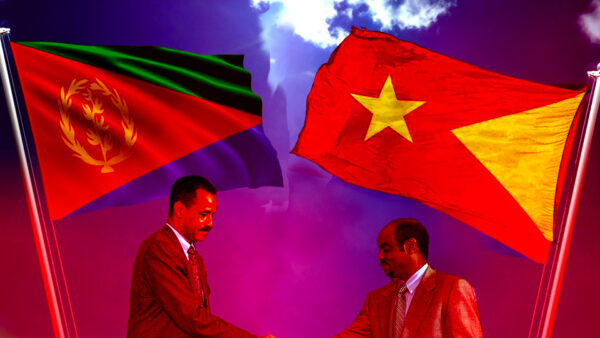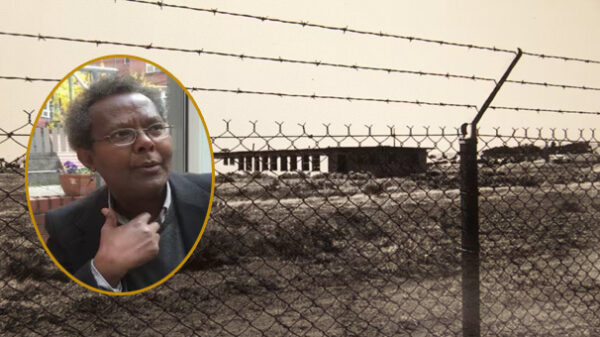Eritrean Churches: Mute And Without opinion

“The church must be the guide and the critic of the State and never its tool.” writes Dr Martin Luther King Jr, outraged by the silence of many churches regarding racial injustice of his time. The church, or any religious institution for that matter, should not hope to earn favors or avert scorn from government by such means as self-censoring on issues that the government labels “politics”. Not when the issues are well within the domain of the church’s teachings. Dr Luther, in continuation, warns unless the church recaptures its position in society as a guide and critic of the state “…it will become an irrelevant social club without moral or spiritual authority.”1
No other institutions or organizations can claim as much influence on our language, customs and laws than our religious institutions. Almost every major node of the Eritrean life is influenced and marked by our religious belief; from birth to death and anything in between. Marriage, family, divorce, loss of a loved one, all are shaped by religious convictions and involvement of religious leaders and followers. The role our religious institutions also extend to issues of global interest such as spread of diseases, drought, famine, war and issue of environmental degradations, to mention some.
Regardless of many challenges throughout time, our religious institutions continue to render their services. They continue to be the source of inspiration, wisdom, hope and comfort to many. Unfortunately in the last two decades, manipulations of religious affairs by the current tyranny—I dare to say ‘internal threat to our religious institutions’—has tried to demolish all the above mentioned blessings and the positive images of our faiths consequently leaving many unsheltered.
Almost half a century of Marxist style oppression has left religious institutions in Eritrean voiceless on a lot of issues that face our society today. Our religious institutions today have chosen silence and don’t seem to have an opinion, even on common-sense social and moral issues, especially if those issues are the sort that make the ruling party uncomfortable. I am particularly concerned with those smaller evangelical denominations. In my opinion these being the most persecuted by the government are yet the most silent in this regard.
There are of course situations where the silence of churches is understandable. The church may refrain from opinions simply because it is not well informed of the facts. It would be reckless of a church to base its understanding on information gathered from the news or social medias. Other times the church may not respond simply because the issues are too trivial or irrelevant to its doctrines.
But there are plenty of other issues that are neither trivial nor irrelevant for the church to keep silent. Would you feel comfortable with a church deciding to keep its voice down in the midst of a genocide because the Rwandan authorities find it bad to their reputation? Would you find it appropriate of a Church to keep silent during the holocaust so as not to offend the Nazis? Do you think it is OK then for Eritrean churches to keep silent in the midst of arbitrary arrest, torture and murder of ordinary citizens.
The lack of sincere opinions on the part of Eritrean churches regarding the current government has left many practicing Christians confused as to how to participate in Eritrean affairs. Many are not sure if they can reconcile activism with their faith. As a result of such confusion many of the devout have decided to stay clear of Eritrean ‘politics’. Many choose to focus only on short-term, ‘practical’ and politically ‘neutral’ activities. I am referring to activities that would directly affect themselves or their immediate families and friends only. I don’t know how one would square such a philosophy with the teachings of Christianity. Any activity we do to help even our immediate families can’t be politically neutral anyway. Not in the current Eritrea. In being practical to help our friends and family back home, we inevitably have to break Eritrean ‘government laws’—be it in smuggling-in of currency, smuggling-out of our loved ones, bribing Eritrean officials/prison guards, bribing Sudanese or Kenyan official to get papers, seeking asylum; the list is endless. If such actions are not considered dissidence and defiance to the Eritrean government, I don’t know what is.
I am not trying to argue that Eritrean congregations lack sympathy to the suffering our people. I am just saying that many are unacceptably quiet about it. My concern is that many christians are comfortable to restrict their activity only the spiritual side. They think that as men and women of faith, they should separate themselves from all the “dirty-politics” and just focus on spiritual activities such as prayer for Eritrea. Personally I don’t find anything wrong with that, just as there is nothing wrong with praying for the sick or the needy. But just as praying for the sick does not mean one forfeits the responsibility to actually help the sick, by the same measure, praying for Eritrea does not mean one forfeits the responsibility to actually take part in bringing about the change they are praying for. Prayer is never a reason for inaction. No one has to be less of a Christian to be more of a citizen. Quite the contrary, the Christian faith demands responsible citizenship. An obedient Christian can be expected to be active in social, economic and political aspects of daily life and even join political and social associations. If a person has not learned to respect, tolerate and work with people of all faiths, he/she is not a good Christian after all.
Many such devout are comfortable with signing petitions to ask governments of Malta or Egypt or Israel to “stop violence against Eritreans”. Most find it acceptable to forward petition letters to foreign governments calling for “justice to Eritrean refugees”. Yet the same people are very uncomfortable when the petition reads something like “PFDJ, stop violence against Eritreans”. Being silent about injustice is far from being neutral.
I would like to end with a bible quote from the book of Esther, where the just man Mordecai senses hesitation of the queen—Esther—to plead with the king to stop the murder of her people throughout the Persian empire. Mordecai writes back to the queen starting with these words, “For if you keep silent at this time…”2. He continues to warn her that her silence will be to the destruction of her household as well. I feel Eritrean churches (especially in diaspora) are also in a situation similar to the queen’s. For Eritrean churches to keep silent at a time like this is unacceptable.
I hope our churches will consider it their responsibility and speak-up with love and wisdom to abate the violence of our government to its own people. I also hope individuals will consider it their responsibility to be good citizens and fight for peace and justice. I left Eritrea two years ago and I remember many congregations there praying for an honest and God-fearing government. I hope that each of us will take it upon ourselves to be an answer to their desperate cry and invest our talent, time and money to ensure that evil does not continue to triumph in our land.
_______________________
References:
(1) Martin Luther King, Jr., Strength to Love (Fortress Press, 1963)
(2) Book of Esther, (14:14 ESV)




Awate Forum